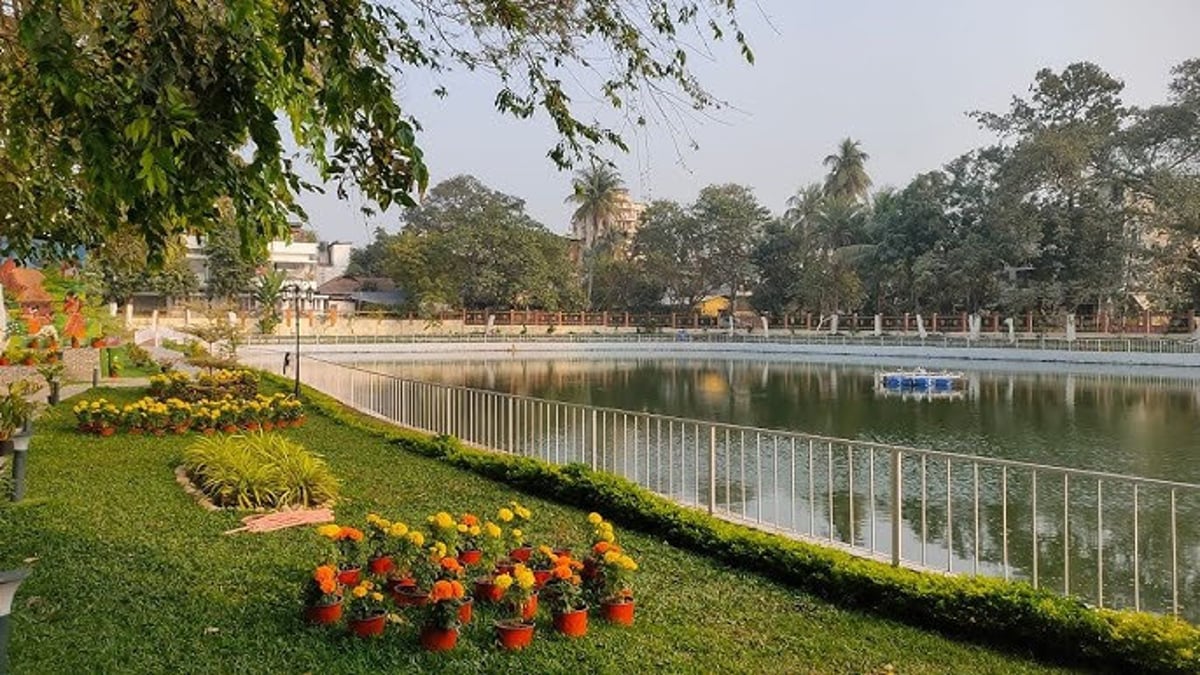
Nikeeta Borkakoti
The twin ponds at Ugartara Mandir, Jor-Pukhuri, a serene water body nestled near Lamb Road, have long been home to an endangered species of turtles. However, the recent plight of these vulnerable creatures has highlighted the devastating effects of pollution and environmental neglect. What was once a safe haven for the turtles has now become a danger zone, with alarming signs that the ecosystem is on the brink of collapse.
This situation, marked by the deaths of turtles and other wildlife such as a swan, serves as a stark reminder of the threats facing our natural world due to human inaction. A detailed examination of the problem reveals critical areas where immediate intervention is required to prevent further ecological disaster.
The turtles in question belong to an endangered species, meaning their populations are already at risk of extinction. Their survival depends heavily on a clean, well-maintained habitat, but the current state of their pond paints a bleak picture. The site shows the water body choked with debris, polluted with plastic, and filled with rotting organic matter, making it clear that the pond has not been maintained. This level of pollution is hazardous to any form of aquatic life, as it disrupts the natural balance of oxygen, nutrients, and waste processing in the water.
Polluted water bodies like this one can cause a range of health problems in wildlife, from respiratory issues due to low oxygen levels to infections caused by bacteria and parasites thriving in the contaminated environment. In the case of the turtles, they may be suffering from toxicity caused by ingesting or being exposed to pollutants in the water. The dead swans found near the pond suggest that the pollution is affecting more than just the turtles, pointing to a broader environmental health issue that could threaten other species in the area.
The pond’s proximity to Lamb Road, a busy thoroughfare with heavy traffic, poses an additional threat to the turtles. In their desperation to escape the increasingly toxic environment, some turtles have been spotted leaving the pond and venturing onto the road. This behaviour is highly unusual and suggests that the turtles are fleeing from a lethal situation. Unfortunately, the road is not a safe refuge. With no protective barriers or warning signs for drivers, the turtles are at high risk of being run over.
Road accidents involving wildlife are not uncommon in urban areas, but in the case of an endangered species, the stakes are much higher. Each turtle that is lost to pollution or road accidents represents a significant blow to the species’ survival. Without immediate action, the population of these turtles could dwindle to unsustainable levels, eventually leading to local extinction.
The situation demands urgent intervention from local authorities, environmental agencies, and wildlife conservationists. The endangered status of the turtles means that their protection is not just a moral obligation but a legal one as well. Under India’s Wildlife Protection Act, 1972, certain species of turtles are listed as protected, and any harm done to them or their habitat is punishable by law.
However, legal protections are only effective if they are enforced. In this case, authorities need to prioritise the cleanup and restoration of the pond to prevent further wildlife deaths. This would involve removing the pollutants, ensuring proper drainage and water circulation, and possibly introducing measures to purify the water. Additionally, steps must be taken to monitor the pond regularly to prevent a recurrence of pollution.
Beyond restoring the pond itself, measures to protect the turtles from road traffic are essential. Installing a fence around the pond would help keep the turtles from wandering onto the road, while speed restrictions and warning signs for drivers could reduce the likelihood of road accidents.
The crisis at Ugartara Mandir Pond is not an isolated incident. Across India, urban water bodies are facing similar challenges due to pollution, encroachment, and neglect. These ponds, lakes, and rivers are often crucial habitats for local wildlife, particularly in cities where natural ecosystems have been drastically reduced by human development. Yet, they are frequently treated as dumping grounds for waste, leading to the degradation of water quality and the destruction of habitats.
This incident is a microcosm of the broader environmental problems that stem from urbanization and a lack of environmental stewardship. As cities expand, natural spaces are increasingly encroached upon, leaving wildlife with fewer and fewer safe havens. The consequences are dire: species that once thrived in urban areas are disappearing, and those that remain are struggling to survive in degraded habitats.
While authorities have a key role to play in addressing the crisis, the local community must also be involved in conservation efforts. Public awareness campaigns can help educate residents about the importance of maintaining clean water bodies and protecting local wildlife. Simple measures like avoiding littering, participating in pond cleanup drives, and advocating for the enforcement of environmental laws can make a significant difference.
By working together, local authorities, environmental groups, and the community can restore the pond to its former glory and create a safe environment for the turtles and other wildlife. But this requires not only short-term action but also a long-term commitment to environmental stewardship. The consequences for the turtles and the ecosystem as a whole will be dire if we do not take action right away. This situation is a wake-up call for all of us to take responsibility for the world we live in and the creatures we share it with. The time to act is now, before it’s too late.
